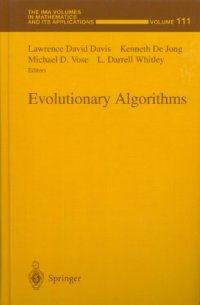
Ebook: Evolutionary Algorithms
- Genre: Mathematics
- Tags: Artificial Intelligence (incl. Robotics)
- Series: The IMA Volumes in Mathematics and its Applications 111
- Year: 1999
- Publisher: Springer-Verlag New York
- City: New York
- Edition: 1
- Language: English
- pdf
This IMA Volume in Mathematics and its Applications EVOLUTIONARY ALGORITHMS is based on the proceedings of a workshop that was an integral part of the 1996-97 IMA program on "MATHEMATICS IN HIGH-PERFORMANCE COMPUTING." I thank Lawrence David Davis (Tica Associates), Kenneth De Jong (Computer Science, George Mason University), Michael D. Vose (Computer Science, The University of Tennessee), and L. Darrell Whitley (Computer Science, Colorado State University) for their excellent work in organizing the workshop and for editing the proceedings. Further appreciation is ex tended to Donald G. Truhlar (Chemistry and Supercomputing Institute, University of Minnesota) who was also one of the workshop organizers. In addition, I also take this opportunity to thank the National Science Foundation (NSF), Minnesota Supercomputing Institute (MSI), and the Army Research Office (ARO), whose financial support made the workshop possible. Willard Miller, Jr., Professor and Director v PREFACE The IMA Workshop on Evolutionary Algorithms brought together many of the top researchers working in the area of Evolutionary Com putation for a week of intensive interaction. The field of Evolutionary Computation has developed significantly over the past 30 years and today consists a variety of subfields such as genetic algorithms, evolution strate gies, evolutionary programming, and genetic programming, each with their own algorithmic perspectives and goals.
The IMA Workshop on Evolutionary Algorithms brought together many of the top researchers in the area of Evolutionary Computation for a week of intensive interaction. The field of Evolutionary Computation has developed significantly over the past 30 years and today consists of a variety of subfields such as genetic algorithms, evolution strategies, evolutionary programming, and genetic programming, each with its own algorithmic perspectives and goals. The workshop did a great deal to clarify the current state of the theory of Evolutionary Algorithms. The existing theory might be characterized as deriving from two principal approaches. There is a high level macro-theory that looks at the processing of "building blocks" and "schemata" that are shared by many good solutions when searching a problem space. There is also a low level micro-theory that builds exact Markov models of the search process. It is sometimes hard for researchers working at such different levels of abstraction to interact. The IMA workshop allowed researchers working at these different levels to present their points of view and to move toward common ground. There was real progress in communication between theorists and practitioners in the evolutionary computation field. Speakers presented applications across a wide range of problem areas. In some of those cases, theoretically motivated methods work quite well. In other cases, practitioners used domain-based methods to obtain better performance than could be achieved by using a "pure" evolutionary algorithm. Individuals on both sides went away with a better appreciation of the successes and failures of current theory.